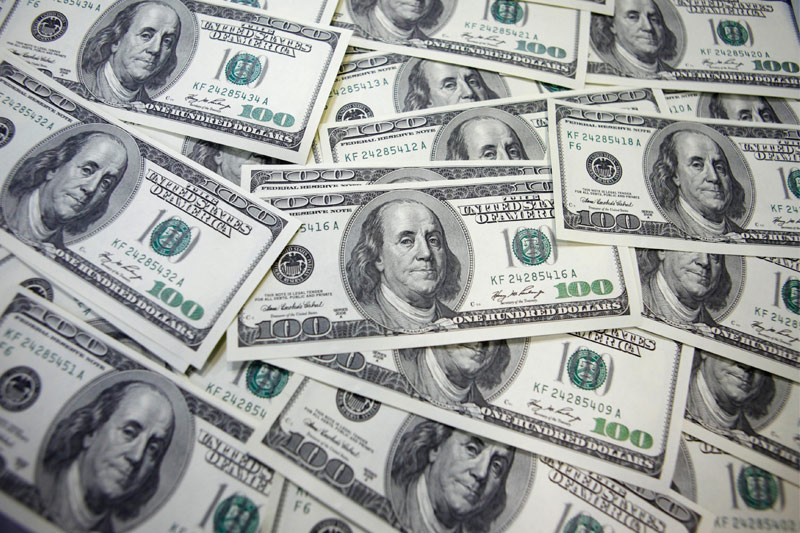Investing.com - The dollar traded steady to lower against most major currencies after Chinese factory data beat expectations.
A earnings warning from Panasonic spooked investors and fueled some safe-haven dollar demand, while hopes for an ebbing European debt crisis enticed some investors out of the safety of the greenback, allowing for a tug-of-war trading session.
In Asian trading on Thursday, EUR/USD was up 0.03% at 1.2960.
Electronics giant Panasonic predicted a net loss of JPY765 billion for the fiscal year, catching investors off guard and sending them chasing safe-haven greenback positions.
Investors put the earnings aside after digesting Chinese factory data.
China's official purchasing managers' index rose to 50.2 in October from 49.8 in September, slightly missing expectations for a reading of 50.3.
Private-sector Chinese factory data beat expectations, however.
HSBC China Purchasing Managers' Index rose to 49.5 in October from 47.9 in September, beating expectations for 49.1.
The dollar rose and stocks fell initially on Panasonic's profit warning though appetite for risk emerged anew in wake of the Chinese factory numbers.
Renewed hopes for a way out of the European debt crisis bolstered spirits as well, which capped the greenback's gains.
Eurozone finance ministers are mulling giving Greece more time to meet deficit-reduction targets, and hopes Greece will be granted an extension sent the euro and other higher-yielding assets rising against the dollar earlier.
The euro and other higher-yielding currencies saw support from Spanish Prime Minister Mariano Rajoy, who said he would not rule out asking for a bailout.
Requesting financial assistance would allow Spain to tap the European Central Bank's bond-buying program, which would lower yields in Spanish government debt auctions and ease credit conditions in the country.
The greenback, meanwhile, was down against the pound, with GBP/USD trading down 0.02% at 1.6126.
The dollar was up against the yen, with USD/JPY trading up 0.29% at 80.00 and down against the Swiss franc, with USD/CHF trading down 0.01% at 0.9315.
The dollar was up against its cousins in Canada, Australia and New Zealand, with USD/CAD trading up 0.09% at 1.0003, AUD/USD down 0.04% at 1.0371 and NZD/USD trading down 0.10% at 0.8217.
The dollar index, which tracks the performance of the greenback versus a basket of six other major currencies, was down 0.01% at 79.99.
Later Thursday, the U.S. will release its weekly government report on initial jobless claims, as well as official data on nonfarm productivity and labor costs, important inflationary indicators.
In addition, the Institute of Supply Management is to publish data on U.S. manufacturing activity.
A earnings warning from Panasonic spooked investors and fueled some safe-haven dollar demand, while hopes for an ebbing European debt crisis enticed some investors out of the safety of the greenback, allowing for a tug-of-war trading session.
In Asian trading on Thursday, EUR/USD was up 0.03% at 1.2960.
Electronics giant Panasonic predicted a net loss of JPY765 billion for the fiscal year, catching investors off guard and sending them chasing safe-haven greenback positions.
Investors put the earnings aside after digesting Chinese factory data.
China's official purchasing managers' index rose to 50.2 in October from 49.8 in September, slightly missing expectations for a reading of 50.3.
Private-sector Chinese factory data beat expectations, however.
HSBC China Purchasing Managers' Index rose to 49.5 in October from 47.9 in September, beating expectations for 49.1.
The dollar rose and stocks fell initially on Panasonic's profit warning though appetite for risk emerged anew in wake of the Chinese factory numbers.
Renewed hopes for a way out of the European debt crisis bolstered spirits as well, which capped the greenback's gains.
Eurozone finance ministers are mulling giving Greece more time to meet deficit-reduction targets, and hopes Greece will be granted an extension sent the euro and other higher-yielding assets rising against the dollar earlier.
The euro and other higher-yielding currencies saw support from Spanish Prime Minister Mariano Rajoy, who said he would not rule out asking for a bailout.
Requesting financial assistance would allow Spain to tap the European Central Bank's bond-buying program, which would lower yields in Spanish government debt auctions and ease credit conditions in the country.
The greenback, meanwhile, was down against the pound, with GBP/USD trading down 0.02% at 1.6126.
The dollar was up against the yen, with USD/JPY trading up 0.29% at 80.00 and down against the Swiss franc, with USD/CHF trading down 0.01% at 0.9315.
The dollar was up against its cousins in Canada, Australia and New Zealand, with USD/CAD trading up 0.09% at 1.0003, AUD/USD down 0.04% at 1.0371 and NZD/USD trading down 0.10% at 0.8217.
The dollar index, which tracks the performance of the greenback versus a basket of six other major currencies, was down 0.01% at 79.99.
Later Thursday, the U.S. will release its weekly government report on initial jobless claims, as well as official data on nonfarm productivity and labor costs, important inflationary indicators.
In addition, the Institute of Supply Management is to publish data on U.S. manufacturing activity.
